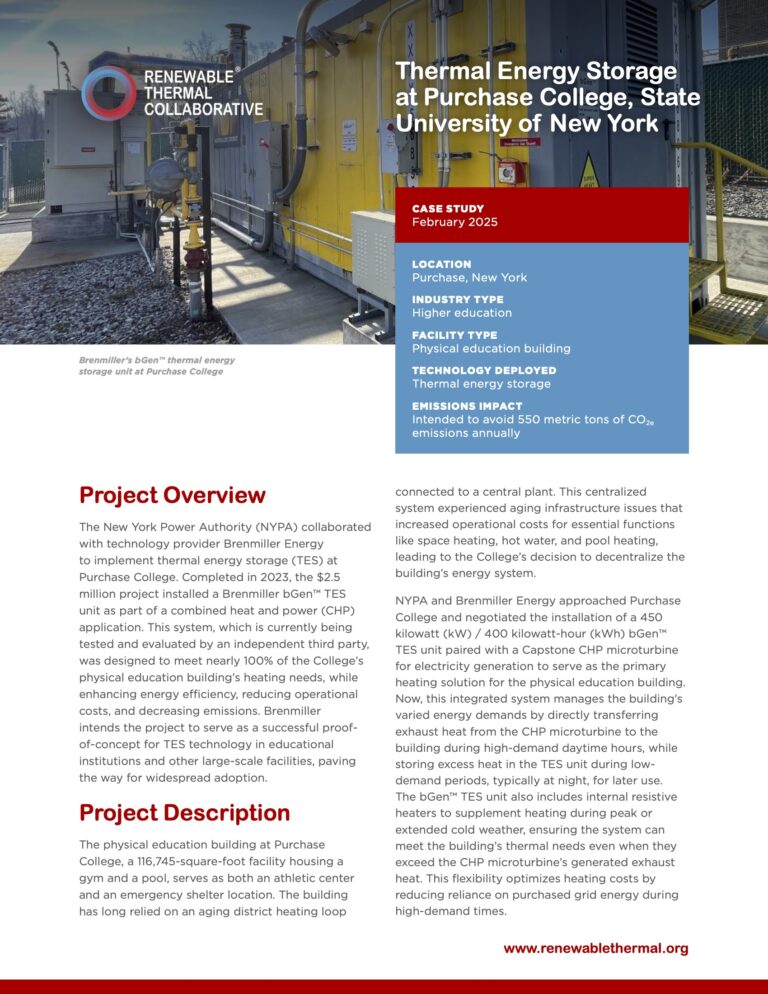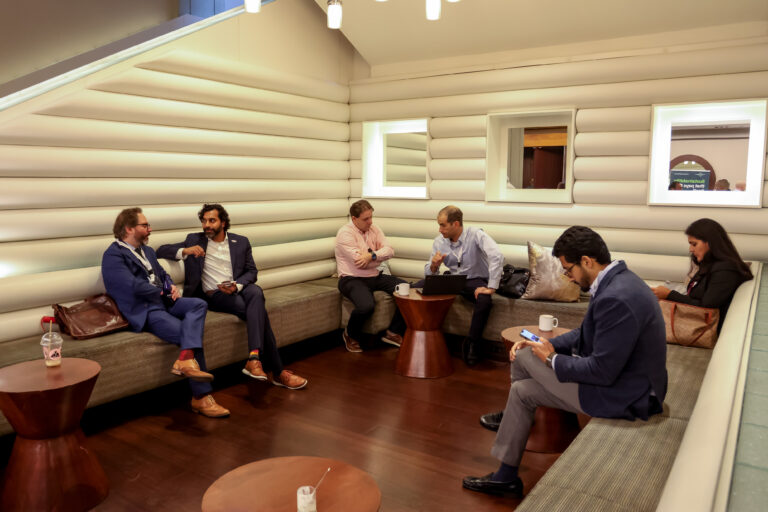For Immediate Release
October 12, 2023 9:00 am ET
Renewable Thermal Collaborative’s Quarterly Update on Industrial Decarbonization
New Members, New Research, New Projects
Washington, D.C. – The Renewable Thermal Collaborative (RTC), the only global coalition focused exclusively on the decarbonization of thermal energy with renewable solutions, today shared its Quarterly Update on Industrial Decarbonization (QUID). Highlights of the third quarter include: two new Members and four new Solutions Providers joining the collaborative; two new research publications released and four events conducted; and seven new projects announced by Members and Solutions Providers. These highlights represent some, but not all, of the progress being made towards the RTC objective of accelerating the pace of industrial decarbonization to meet critical climate targets.
“We are enjoying incredible momentum leading up to our fourth annual RTC Summit later this month,” remarked Blaine Collison, RTC Executive Director. “Our third quarter highlights continue to demonstrate the need, opportunity and support for adoption of renewable heating and cooling solutions to help decarbonize global thermal energy use. They also clearly demonstrate the power of collaboration, which is the driving force behind our upcoming summit that will bring together large thermal energy users, renewable solutions suppliers, financiers, governments, and nonprofits from across the globe.”
Highlights of this quarter include the following updates:
1) Two New Members and Four New Solutions Providers
With the addition of the following companies this quarter, the RTC includes 35 Member companies and 44 Solutions Providers in the United States and around the world. Members include global industrial and institutional energy buyers representing more than $3 trillion in market capitalization across a diverse range of industries, including chemical, food and beverage, manufacturing, and pharmaceutical. Solutions Providers are technology and solutions providers, advisors, developers and others working to accelerate the renewable thermal market.
New Members (https://www.renewablethermal.org/our-members/)
Charles River Laboratories provides products and services to help pharmaceutical and biotechnology companies, government agencies and leading academic institutions around the globe accelerate their research and drug development efforts. Their sustainability strategy focuses on reducing their Scope 1 and 2 Greenhouse Gas (GHG) emissions and working with their suppliers to promote more sustainable supply chain practices.
Kenvue makes everyday personal care products that are used around the world. Their iconic brands include AVEENO®, BAND-AID® Brand Adhesive Bandages, JOHNSON’S®, LISTERINE®, NEUTROGENA®, TYLENOL® and ZYRTEC®.
From product design and raw material sourcing to manufacturing and packaging recyclability, their sustainability strategy supports their business objectives.
New Solutions Providers (https://www.renewablethermal.org/our-sponsors/)
Hydrogen Technologies is a clean hydrogen company dedicated to sustainable solutions. They have patented a method for burning hydrogen and oxygen in a vacuum chamber to create high-temperature heat and steam with zero greenhouse gases for the commercial and industrial boiler market.
NovoHydrogen leverages deep energy sector knowledge to provide green hydrogen solutions to large-scale industrial, transportation, and power sector customers. They focus on origination, project development, financial structuring, construction and operations of green projects.
Scale Microgrids is a vertically integrated distributed energy platform focused on designing, building, financing, owning, and operating distributed energy assets. Their team of energy and financing experts accelerate growth in distributed energy projects by providing financing to technology providers, energy developers, and OEMs, while also directly helping large energy-consuming customers manage their energy infrastructure.
Spirax Sarco is a leader in steam system engineering and management. Their team of 1,300 steam experts across 62 countries provide customers with insights, best practices and knowledge to find and fix problems in their steam processes. Their range of equipment solutions support every aspect of steam and fluid processing infrastructure.
2) Six New Publications and Events
The RTC collaborates with its Members and Solutions Providers to actively evaluate technologies and advocate for policies that can help accelerate significant decarbonization. The RTC focuses on the full-range of renewable energy technologies across all industrial, commercial and institutional applications. Two new research publications were released and four events were held in the third quarter:
Publications (https://www.renewablethermal.org/category/publications/)
Electrification Road Map: The RTC’s Electrification Working Group developed a revamped Electrification Roadmap to help thermal energy users identify, analyze and execute electrification projects and shift heat production away from fossil fuels to electric technologies powered by renewable sources. End users can follow the roadmap like adecision tree to explore the key considerations and questions to ask when crafting industrial electrification plans.
Playbook for Decarbonizing Process Heat in the Food & Beverage Sector: World Wildlife Fund (WWF) and Guidehouse co-authored this report on behalf of the RTC. It is designed to be a hands-on guide for industrial heat pump implementation as an enabler for food and beverage sector decarbonization. The report specifically assesses major barriers to adoption of heat pumps and electric boilers, provides recommendations corporate energy buyers can implement to switch to industrial heat pump and boilers at their facilities, and describes priority actions other stakeholders can take to support the deployment of the technologies.
Congressional Briefing: The Renewable Thermal Vision: The RTC held an in-person briefing on Capitol Hill presenting the findings of the Renewable Thermal Vision Report and its implications for policymakers. The report examines priority industrial sectors in the United States and analyzes their thermal energy use by industrial process, temperature (high, medium, and low), and geography. Incorporating post-Inflation Reduction Act cost projections and estimates of technology availability, the report identifies five parallel pathways to decarbonize U.S. industry by 2050.
Expert Webinar: Playbook for Decarbonizing Process Heat in the Food & Beverage Sector: The RTC hosted a webinar to release the Playbook publication. The event outlined the findings of the playbook, highlighting the major technology, market, and policy barriers to heat pump and electric boiler adoption. Speakers from RTC, WWF, and Guidehouse explained the concrete, actionable recommendations for energy buyers and other stakeholders included in the report.
NYC Climate Week 2023: The RTC hosted two events:
- Accelerating Decarbonization in the Food & Beverage Sector: RTC and Diageo held a sold-out event at Diageo headquarters in the World Trade Center featuring an expert panel discussion on how food and beverage leaders are approaching thermal decarbonization. Panel members included representatives from RTC Member companies Diageo, Mars, Oatly and PepsiCo.
- Decarbonizing Industrial Heat: Could It Be Easier than We Thought? At the Nest Campus, staff from RTC and Boston Consulting Group presented recent analysis showing that we have more opportunities and technological options to meet our 2030 climate goals than simply going after the most difficult to decarbonize sectors that use the highest temperatures. This interactive session profiled industrial heat emissions in the U.S. in key sectors, highlighted opportunities across industry, and dove deeper into the promise and challenges of several unsung technology opportunities. Featured speakers included representatives from WWF, Colgate-Palmolive, ACEEE, Proctor & Gamble and Rondo Energy.
3) Six New Member & Solutions Provider Projects
The RTC is the only place where large thermal energy users come together collaboratively with innovative solutions providers to understand the problems in the market, learn from each other, and overcome the barriers to renewable heating and cooling. The following six projects by RTC Members and Solutions Providers further demonstrate continued engagement in expanding industrial decarbonization projects and programs worldwide:
Member Projects
AstraZeneca: RTC Member AstraZeneca has partnered with Future Biogas to develop a new anaerobic digestion facility that will produce 100 GWh of biomethane per year, equivalent to the heat demands of over 8,000 homes. The renewable fuel will be used to heat AstraZeneca’s sites in Macclesfield, Cambridge, Luton and Speke in the United Kingdom, and will reduce emissions by an estimated 20,000 tonnes CO2e per year. The partnership supports AstraZeneca’s goal of achieving net zero by 2045. It also provides a blueprint for the commercial adoption of renewable gas in the UK.
Kimberly-Clark: RTC Member Kimberly-Clark celebrated the opening of a new onshore wind farm in South Lanarkshire, Scotland. The 50 MW 12-turbine facility will supply the company with approximately 160,000 MWh of renewable electricity every year, reducing annual emissions by 55,625 MTCO2e and decarbonizing 80% of its UK electricity needs. The project contributes to Kimberly-Clark’s wider sustainability strategy and its ambition to halve its total environmental footprint and use 100% renewable energy by 2030. The company is also working to develop on-site solar power and green hydrogen projects.
Saint-Gobain: RTC Member Saint-Gobain has successfully conducted a large-scale trial to test the use of hydrogen as a fuel for its glass furnaces. The trial was conducted at the company’s plant in Herzogenrath, Germany, and involved replacing 30% of the natural gas used in the furnace with hydrogen. The results of the trial were promising, and the company believes that hydrogen could help to reduce its direct CO2 emissions by up to 70%. The successful trial supports Saint-Gobain’s efforts to decarbonize its operations and achieve net zero carbon emissions by 2050.
Unilever: RTC Member Unilever is partnering with Industrial Solar and Turbo Control to develop a Fresnel collector system at its factory in Cuernavaca, Mexico. The project will use solar energy to generate steam for the facility’s process heating applications, the first-of-its-kind in Latin America. The solar thermal system will begin operating in the first quarter of 2024 and will generate enough steam to power 10% of the factory’s industrial processes, reducing annual CO2 emissions by an estimated 1,000 tons. The installation support’s Unilever’s commitment to reduce emissions 50% by 2030.
Solutions Provider Projects
Bioenergy Devco: RTC Solutions Provider Bioenergy Devco received permitting approval to construct an organics recycling facility at its Bioenergy Innovation Center in Seaford, Delaware. The facility will use anaerobic digestion to turn organic food waste into clean, renewable natural gas (RNG) and agricultural products. The project will produce enough RNG each year to reduce emissions equivalent to taking nearly 19,000 gasoline-powered cars off the road.
Brenmiller Energy: RTC Solutions Provider Brenmiller Energy will deploy its bGen™ ZERO thermal energy storage (TES) system to supply process heat to Wolfson Hospital, a public medical center near Tel Aviv, Israel. Pending completion of the final agreement, it will deliver supply heat to Wolfson Hospital at zero up-front cost for a seven-year term. Brenmiller’s TES technology will help alleviate high energy costs for Wolfson Hospital and lower its carbon footprint by 3,900 tons per year.
###
About the Renewable Thermal Collaborative
The Renewable Thermal Collaborative (RTC) is a global coalition of companies, institutions and governments committed to decarbonizing their operations by scaling up renewable heating and cooling technologies at their facilities. The RTC collaborates with its Members and Solutions Providers to accelerate industrial decarbonization by addressing and identifying ways to overcome the technology, policy and market challenges that large thermal energy users face. Learn more at www.renewablethermal.org.



